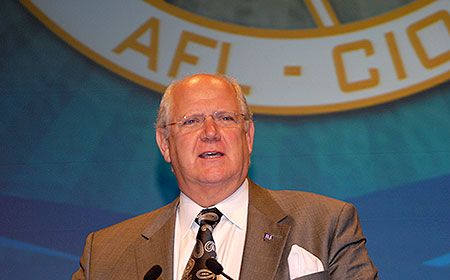Joseph Bonney, Senior Editor
International Longshoremen’s Association President Harold Daggett said the ILA won’t change its contract bargaining process, except possibly to try to reverse the order in which coastwide and local agreements are negotiated.
Daggett responded to remarks by David Adam, chairman and CEO of United States Maritime Alliance, who challenged employers and the ILA to review their bargaining process with an eye to making it less disruptive to shippers.
Speaking Wednesday at the 2nd annual JOC Port Performance conference in Newark, New Jersey. Adam emphasized that he was not proposing changes. He said he merely was suggesting that employers and union consider whether there’s “a better way” that doesn’t scare away shippers whose cargo provides port jobs.
“The answer is no,” Daggett told JOC .com. “We’re going to continue to negotiate the way we negotiate now.”
However, Daggett said the ILA may seek in future bargaining to delay its Maine-to-Texas master contract with USMX until after negotiators complete supplementary local contracts covering work rules, pensions and other port-specific issues. The current ILA-USMX contract expires Sept. 30, 2018.
Current practice is to negotiate local agreements after the ILA and USMX settle their master contract, which covers container and roll-on, roll-off wages, container royalties, health care, technology and other coastwide issues.
Daggett said the right to strike is a union’s ultimate leverage in contract negotiations, and that the ILA wants to retain its right to use it in local negotiations.
He cited an arbitrator’s decision Friday that said that the master contract’s no-strike clause applies to ships and cargo covered by the coastwide agreement, even in ports where local contracts have not been concluded.
Although the ILA and USMX ratified their master contract in April 2013, supplementary local contracts remain incomplete in Charleston, Baltimore, and Mobile, Alabama.
An arbitrator ruled that Baltimore Local 333 violated the master contract’s no-strike clause by conducting a strike that idled the port’s public terminals for three days in October 2013. The arbitrator’s decision Friday involved Charleston, where the ILA has not gone on strike.
Contact Joseph Bonney at [email protected] and follow him on Twitter: @JosephBonney.

